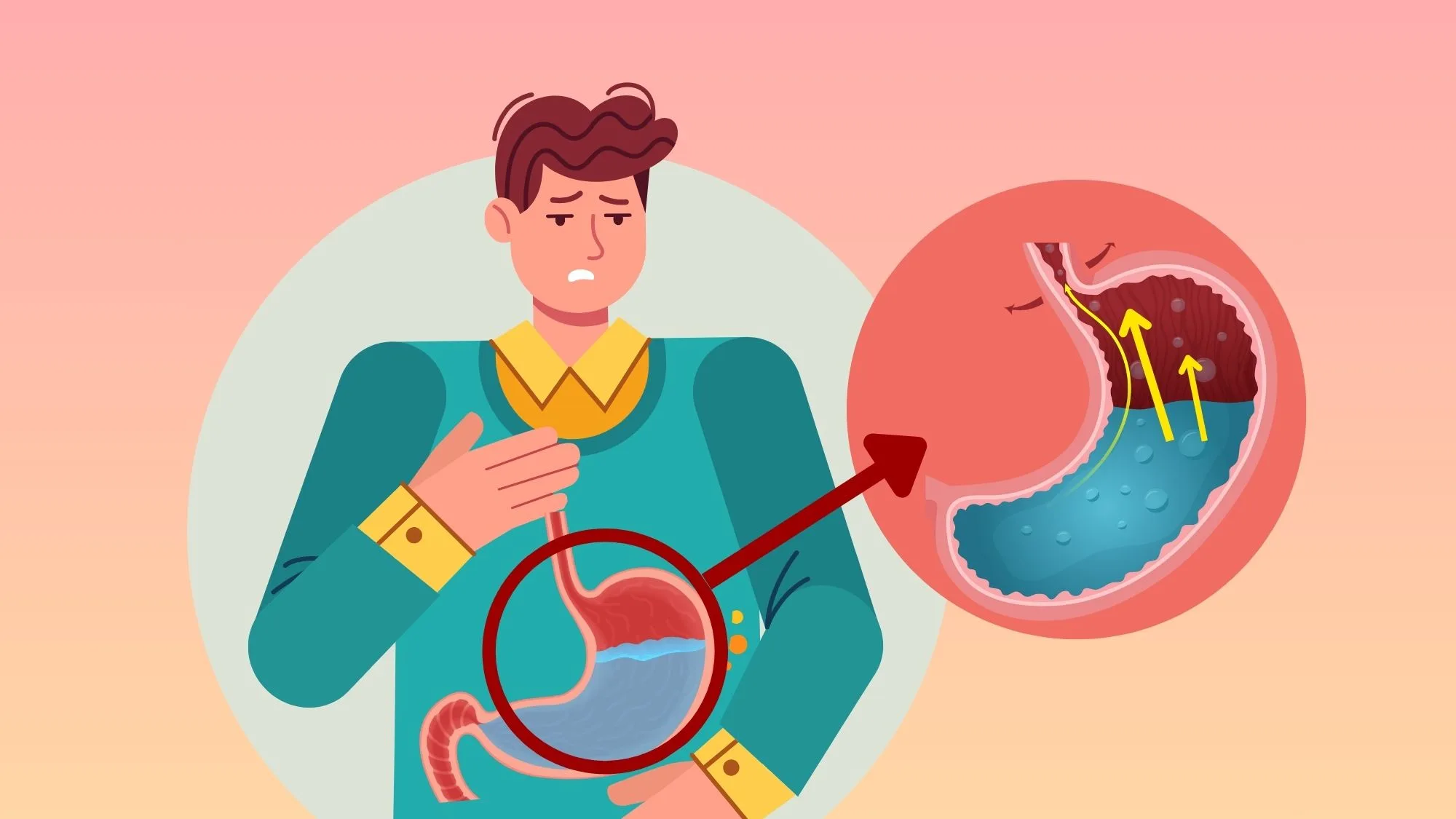
Can You Die from Acid Reflux in Your Sleep?
October 13, 2025
Acid reflux, medically known as Gastroesophageal Reflux Disease (GERD), is one of the most common digestive conditions worldwide. It occurs when stomach acid flows backward into the esophagus, causing irritation, heartburn, and discomfort.
For most people, GERD is manageable through lifestyle adjustments and medication. But when reflux strikes at night, it can become more dangerous, leading many to ask a frightening question: Can acid reflux actually kill you in your sleep?
Let’s separate fact from fear and explore what science says about the real risks of nighttime acid reflux, how it can become life-threatening, and what you can do to protect yourself.
Understanding Acid Reflux and Why It Happens
Your esophagus connects your throat to your stomach. At its base lies the lower esophageal sphincter (LES), a circular muscle that acts like a valve, preventing stomach contents from flowing backward.
When this valve weakens or relaxes inappropriately, stomach acid can travel upward, leading to symptoms such as:
- Heartburn or burning in the chest
- Regurgitation (acid or food coming back up)
- Coughing or hoarseness
- Chest pain, especially after eating or lying down
Occasional reflux is normal. However, if symptoms occur two or more times per week, it may indicate chronic GERD, a condition that requires medical evaluation and treatment.
Why Nighttime Reflux Can Be More Severe
Lying flat during sleep changes how gravity affects the digestive system. When you’re upright, gravity helps keep stomach acid where it belongs. But once you lie down, acid can travel more easily into the esophagus, especially if your LES is weak.
Studies have shown that nocturnal reflux leads to longer acid exposure times and more severe symptoms compared to daytime reflux. During sleep, saliva production decreases and swallowing frequency drops, both of which normally help neutralize acid. The result: prolonged irritation and inflammation in the esophagus.
Potential Dangers of Acid Reflux While Sleeping
Although acid reflux itself doesn’t directly stop your heart or breathing, its complications can become life-threatening over time if left untreated. Here are the main risks to know:
1. Aspiration Pneumonia
One of the most serious concerns with nighttime reflux is aspiration, when stomach acid or contents enter the lungs. This can happen if reflux occurs while you’re asleep and you accidentally inhale the acidic material.
Aspiration may cause inflammation and infection of the lungs, known as aspiration pneumonia, which carries a significantly higher mortality rate than regular pneumonia, particularly in older adults or people with neurological disorders.
According to national data, aspiration pneumonia accounts for tens of thousands of deaths annually in the United States. While this condition is not solely caused by GERD, chronic, severe reflux can increase the risk, especially if you have swallowing difficulties or sleep apnea.
2. Barrett’s Esophagus and Esophageal Cancer
Long-term, untreated reflux can lead to Barrett’s esophagus, a condition where the normal esophageal lining changes to resemble the intestinal lining. Barrett’s is considered a precancerous condition and the primary risk factor for esophageal adenocarcinoma.
However, the good news is that the absolute annual cancer risk is relatively low, about 0.1–0.3% per year for people with non-dysplastic Barrett’s esophagus.
Still, these risks highlight why it’s important not to ignore persistent or worsening reflux symptoms.
3. Strictures and Severe Bleeding
Chronic acid exposure can also cause esophageal strictures (narrowing of the esophagus due to scar tissue) and bleeding ulcers. These complications can lead to difficulty swallowing, vomiting blood, and anemia, which require urgent medical care.
Can Acid Reflux Cause Sudden Death During Sleep?
While rare, certain situations can make nighttime reflux potentially dangerous.
If large amounts of acidic fluid are regurgitated during sleep and inhaled into the lungs, it can block airways, leading to choking, aspiration pneumonia, or even respiratory failure.
This risk is significantly higher in:
- Older adults
- People with neurologic conditions (stroke, dementia, Parkinson’s)
- Individuals with hiatal hernia or obesity
- Patients under sedation or with sleep apnea
In otherwise healthy individuals, the risk of sudden death from reflux is extremely low, but chronic aspiration or unrecognized sleep reflux can still cause dangerous complications over time.
When to See a Gastroenterologist
If you experience the following, you should see a gastroenterologist in Phoenix or your local area as soon as possible:
- Heartburn or regurgitation more than twice per week
- Pain or burning that worsens at night
- Difficulty swallowing or sensation of food getting stuck
- Coughing, choking, or hoarseness at night
- Unexplained weight loss or vomiting blood
Early evaluation helps rule out serious complications like ulcers, strictures, or Barrett’s esophagus.
📍 If you live in Phoenix or nearby areas such as Scottsdale, Tempe, or Glendale, seek care from an experienced Phoenix gastroenterologist specializing in acid reflux management. A professional diagnosis and personalized treatment plan can prevent long-term damage and restore your quality of sleep.
Treatment Options for Nighttime Acid Reflux
1. Lifestyle & Positional Adjustments
Many nighttime symptoms improve with simple changes such as:
- Avoid eating or drinking (especially alcohol, coffee, or fatty foods) within 2–3 hours of bedtime.
- Elevate the head of your bed by 6–8 inches to use gravity to your advantage.
- Sleep on your left side, which has been shown to reduce acid exposure.
- Maintain a healthy weight, since abdominal pressure contributes to reflux.
- Quit smoking and limit alcohol consumption.
These changes are often the first-line recommendation in ACG guidelines for GERD management.
2. Medications
If lifestyle measures aren’t enough, your gastroenterologist may recommend:
- Antacids – quick relief for occasional heartburn.
- H2 blockers (e.g., famotidine) – reduce acid production.
- Proton pump inhibitors (PPIs) – the most effective long-term acid suppression for moderate to severe GERD.
Never self-medicate for extended periods. Long-term use of acid-suppressing medication should be monitored by a physician.
3. Endoscopic or Surgical Options
For patients with severe reflux that doesn’t respond to medication, procedures such as:
- Fundoplication (tightening the LES)
- LINX device implantation (magnetic sphincter augmentation)
may provide lasting relief and reduce dependence on medication.
These options are best discussed with a gastroenterologist or GI surgeon experienced in reflux management.
Preventing Serious Reflux Complications While Sleeping
Taking the right preventive steps can dramatically lower your risk of nighttime reflux episodes and their complications.
Checklist for Nighttime Reflux Prevention:
- Eat smaller, earlier dinners.
- Avoid lying down within 2–3 hours after eating.
- Elevate your head while sleeping.
- Sleep on your left side.
- Maintain a healthy BMI.
- Managing stress, anxiety, and tension can worsen reflux.
- Follow your prescribed GERD medications as directed.
Persistent symptoms despite these measures should always prompt further evaluation.
Myths vs. Facts About Acid Reflux and Death
| Myth | Fact |
| Acid reflux can stop your heart. | False — reflux doesn’t cause cardiac arrest, though chest pain can mimic heart symptoms. |
| You can die suddenly from reflux. | Extremely rare — serious complications usually develop gradually, not suddenly. |
| Over-the-counter antacids are enough for everyone. | False — chronic or severe reflux needs medical supervision. |
| Nighttime reflux only causes heartburn. | False — it can cause coughing, asthma-like symptoms, and lung issues due to aspiration. |
Bottom Line
You’re very unlikely to die from acid reflux in your sleep, but ignoring persistent symptoms can allow dangerous complications to develop silently. With the right treatment, lifestyle changes, and ongoing care, you can manage GERD safely and sleep comfortably.
If you or someone you know suffers from frequent nighttime heartburn, don’t wait — book an appointment with a trusted gastroenterologist in Phoenix today.
Early evaluation and treatment can protect both your digestive health and peace of mind.
FAQ: Acid Reflux & Nighttime Risks
1. Can acid reflux kill you in your sleep?
Direct death from acid reflux is extremely rare. However, untreated reflux can cause aspiration pneumonia or esophageal cancer, which can become life-threatening if ignored.
2. What are signs of dangerous reflux?
Seek immediate care if you experience:
- Difficulty swallowing
- Chest pain that radiates
- Vomiting blood
- Unexplained weight loss
These symptoms can indicate severe esophageal injury or bleeding.
3. How can I prevent acid reflux at night?
Avoid eating late, raise your head during sleep, maintain a healthy weight, and limit alcohol or spicy foods. If symptoms persist, see a Phoenix gastroenterologist for personalized reflux treatment.
4. Can GERD cause choking during sleep?
Yes — reflux reaching the throat can trigger choking, coughing, or even brief breathing interruptions. Chronic aspiration episodes increase the risk of pneumonia.
5. When should I see a gastroenterologist in Phoenix?
If reflux disrupts your sleep, causes chest discomfort, or persists despite medication, consult a Phoenix gastroenterology specialist. Timely diagnosis can prevent complications like Barrett’s esophagus or aspiration-related issues.
